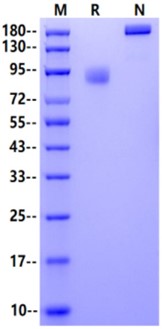Product Details
Product Details
Product Specification
| Species | Mouse |
| Antigen | BTNL2 |
| Synonyms | BTL-II; Butyrophilin like 2; butyrophilin-like 2 (MHC class II associated); Butyrophilin-like 2 |
| Accession | O70355 |
| Amino Acid Sequence |
Lys24-Trp454, with C-terminal Mouse mIgG2a Fc KHPDDFRVVGPNLPILAKVGEDALLTCQLLPKRTTAHMEVRWYRSDPDMPVIMYRDGAEVTGLPMEGYGGRAEWMEDSTEEGSVALKIRQVQPSDDGQYWCRFQEGDYWRETSVLLQVAALGSSPNIHVEGLGEGEVQLVCTSRGWFPEPEVHWEGIWGEKLMSFSENHVPGEDGLFYVEDTLMVRNDSVETISCFIYSHGLRETQEATIALSERLQTELASVSVIGHSQPSPVQVGENIELTCHLSPQTDAQNLEVRWLRSRYYPAVHVYANGTHVAGEQMVEYKGRTSLVTDAIHEGKLTLQIHNARTSDEGQYRCLFGKDGVYQEARVDVQVMAVGSTPRITREVLKDGGMQLRCTSDGWFPRPHVQWRDRDGKTMPSFSEAFQQGSQELFQVETLLLVTNGSMVNVTCSISLPLGQEKTARFPLSGWIEGRMDPEPRGPTIKPCPPCKCPAPNLLGGPSVFIFPPKIKDVLMISLSPIVTCVVVDVSEDDPDVQISWFVNNVEVHTAQTQTHREDYNSTLRVVSALPIQHQDWMSGKEFKCKVNNKDLPAPIERTISKPKGSVRAPQVYVLPPPEEEMTKKQVTLTCMVTDFMPEDIYVEWTNNGKTELNYKNTEPVLDSDGSYFMYSKLRVEKKNWVERNSYSCSVVHEGLHNHHTTKSFSRTPGK |
| Expression System | HEK293 |
| Molecular Weight | 72-95kDa (Reducing) |
| Purity | >95% by SDS-PAGE |
| Endotoxin | <0.1EU/μg |
| Conjugation | Unconjugated |
| Tag | Mouse Fc Tag |
| Physical Appearance | Lyophilized Powder |
| Storage Buffer | PBS, pH7.4 |
| Reconstitution | Reconstitute at 0.1-1 mg/ml according to the size in ultrapure water after rapid centrifugation. |
| Stability & Storage | · 12 months from date of receipt, lyophilized powder stored at -20 to -80℃. · 3 months, -20 to -80℃ under sterile conditions after reconstitution. · 1 week, 2 to 8℃ under sterile conditions after reconstitution. · Please avoid repeated freeze-thaw cycles. |
| Reference |
1.Arnett, H.A. et al. (2007) J. Immunol. 178:1523. 2.Arnett, H.A. et al. (2009) Cytokine 46:370. 3.Smith, I.A. et al. (2010) J. Immunol. 184:3514. 4.Nguyen, T. et al. (2006) J. Immunol. 176:7354. |
Background
Butyrophilin-like 2 (BTNL2) is a member of the BTN/MOG Ig-superfamily and functions as a negative regulator of immune cell activation.BTNL2 is expressed in epithelial cells of the small intestine, colonic dendritic cells, and in cells of the lymph node. BTNL2 expression is upregulated in T cells following activation, a characteristic BTNL2 shares with the homologous B7 family of co-stimulatory molecules. BTNL2 negatively regulates T cells by inhibiting proliferation and inflammatory cytokine secretion. It also increases the expression of FoxP3 in T cells to promote regulatory T cell development. Single nucleotide polymorphisms in BTNL2 are associated with a risk for sporadic prostate cancer, rheumatoid arthritis, sarcoidosis, ulcerative colitis, and other inflammatory diseases.
Picture
Picture
SDS-PAGE



